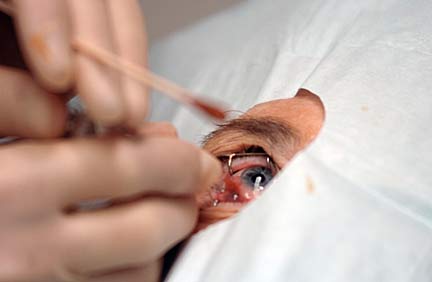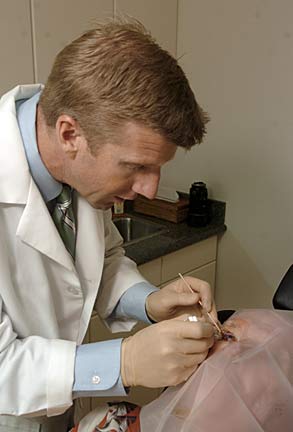Honolulu retinal surgeon

|
See it to believe it
A new treatment for macular
degeneration comes into focus
for Hawaii patients
Patients are leaving Dr. Michael Bennett's office with high hopes of saving or even restoring their vision.
Eighty-one-year-old Francis McCormack of Honolulu said that only five days after a new treatment for macular degeneration in his right eye, he could see movement and colors on the TV instead of "the whole thing black. It's amazing."
Bennett is the first retinal surgeon in Hawaii to offer a treatment approved in December by the Food and Drug Administration to slow vision loss from wet age-related macular degeneration.
The FDA fast-tracked approval of Macugen, a pegaptanib sodium injection, after patients experienced a significant decrease in vision loss in two trials.
The wet form represents only 10 percent of cases (others are the less severe dry form), but it is responsible for 90 percent of vision loss, Bennett said.
Primarily affecting people over age 65, it occurs when abnormal blood vessels grow and leak in the macula, the central vision area of the retina at the back of the eye, he explained. Blind spots and distorted or blurred vision result.
About 2.9 million people will have advanced age-related macular degeneration by 2020, and the number could reach 6.3 million by 2030 with the aging of baby boomers, according to government estimates.
Hawaii, with its large aging population, has a huge number of macular degeneration patients, said Bennett, one of few physicians in the nation given early release of the new medicine.

That procedure involves a cool laser that interacts with the drug to seal leaking blood vessels after they have formed.
"The new medicine targets new blood vessels and prevents them from growing, which is neat," Bennett said. "If they started growing, it minimizes further growth and keeps them from leaking.
"I don't want to sell it as a miracle cure because it is not," he said. "But it promotes hope because it addresses the underlying cause of macular degeneration rather than the symptoms. Up to one-third of patients report some or even a significant degree of improvement."
Bennett, who uses a mix of therapies tailored to each patient, said as eyes age, the retina and underlying tissue become weak, and the body senses the weakness.
"It literally tries to go in and repair the area. It recruits new blood vessels into the eyeball, and they start to leak fluid and leak blood, and the patient loses vision."
Macugen specifically targets a protein called VEGF that triggers the abnormal growth and leakage of blood vessels, he said. "So we're attacking the root problem by disabling the protein and stopping new blood vessels from growing."
The treatments, which take less than 15 minutes, must be done about every six weeks until all leakage or bleeding stops, Bennett said.
He said the new drug costs nearly $1,500 for one dose, but he wanted to make it available as soon as possible and "was willing to take the risks of Medicare (coverage) and see patients smiling again."
Medicare is covering the cost now, and the Hawaii Medical Service Association has said it will follow Medicare, Bennett said.
"Health care carriers realize if a patient loses their vision or goes blind, we now have so many other things to worry about: loss of ambulation, they can't see to walk, they need care, they can trip over a stair or rug and then break a hip," he pointed out.
Russell Kirby, 78, the first patient Bennett treated with Macugen Jan. 28, said he felt nothing when it was done on his left eye. "I sat there a few minutes, got on my scooter and drove home in 4 o'clock afternoon traffic."
Before the injection, "everything was completely blurred," said Kirby, former senior auditor for the Singer Sewing Machine Co. nationwide and assistant executive director for the western half. "I couldn't see faces -- blackout."
After the treatment he could see figures on TV, and "for the first time in ages, I could look in the mirror and see the whites of my eyes," he said.
Kirby was recently back in Bennett's office at 1620 Ala Moana for a follow-up treatment and told three other patients there for the new treatment, "This is going to help you immensely."
Evelina Dela Cruz, 79, said she lost vision in her left eye long ago, but her right eye was good until December. Her doctor at the time said she had bleeding in her eye but it would go away and that she should see him again in four months, she said.
When she said she feared she would lose her vision, he referred her to Bennett, she said. "I am so grateful. If I had waited another four months, I might be completely blind."
Less than a week after the injection, she said, "I could see things that I couldn't see before. Now, I can see the clock and I can see the numbers. ... I hope everything will get better and better."
[News] [Business] [Features] [Sports] [Editorial] [Do It Electric!]
[Classified Ads] [Search] [Subscribe] [Info] [Letter to Editor]
[Feedback]
